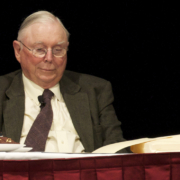Legacy – The Power of Time and Good Behavior
Investing requires one belief above all others: that generally, the world will be a better place in the future than it is today. It’s a disposition that is often at odds with daily news, political banter, and sometimes our belief system. Yet as investors, we desire to be a part of something that grows over time and rewards those who participate.
This perspective drives a desire I often see among my multigenerational clientele – to leave a legacy. Legacy usually means different things to different people. For some, it means leaving the financial resources for their children to pursue a course of work or study independent of income. For others, it means sharing the value of a dollar: what someone had to do to earn it, protect it, and grow it over time. Still, others find it’s a legacy of giving, ensuring that they help care for and participate in the community to generate the wealth.
But creating a legacy requires more than diligent savings and optimism. It is a statement of values, a transfer of understanding from one generation to the next that defines the “why” behind financial assets. Handing over a considerable savings account without this understanding is often detrimental, and sometimes downright damaging.
Reflecting on examples, both those I’ve worked with and those from history, I am reminded of the book Fortune’s Children: The Fall of the House of Vanderbilt, written by a family member of one of the wealthiest Americans ever, Cornelius Vanderbilt (1794-1887). It is said that his wealth was so grand that if he cashed in his empire, he would have claimed one in every ten $20 bills at the time. He was likely the first centimillionaire with more than $100 million. That amount adjusted at today’s inflation rate would be some $220 billion. His son William K. Vanderbilt (1848-1920) doubled the fortune to $440 Billion in the first 10 years of his inheritance.
Then, like many families who follow a similar pattern, not a single family member of the Vanderbilt’s was among the richest in America. They were bypassed by the likes of the Rockefeller’s, the Carnegie’s, the Ford’s, and the Frick’s, to name just a few. Fifty years after William’s death, one of his descendants died broke. In 1973, 120 of the descendants of Cornelius Vanderbilt gathered at Vanderbilt University for the first family reunion, and not one of them was a millionaire. The story is rather tragic because one of the financially largest American legacies evaporated in less than 100 years. It is hard to fathom how it could have happened.
If you’re anything like me, you’d like to build and offer a meaningful legacy to the next generation. My viewpoint of legacy is that wealth, if properly managed, ought to flow like a river, widening, deepening, getting more robust and powerful as it falls through generations. Over time that river has the power to shape something as significant and impressive as the Grand Canyon. That’s why we call our approach the Riverkeeper’s Formula. It’s based on three key ideas:
- Thrift – A discipline of living on less than you earn.
- Investment – Building ownership of businesses and assets that generate rising, repeatable cash flow.
- Personal Values – An understanding of family values that drives the continued growth and protection of those assets for future generations.
This simple formula acts as a three-legged stool. Without one leg, the stool falls over. People who love their family, who love their children, and especially their grandchildren, understand the value of leaving a legacy. Write to your children and grandchildren about the family values you want them to know. You have lived those values. Name them and remind your family of them. It is a way to share your love. Those families who do not have children, find a charity or a cause to share your legacy.
Think about yourself as the Riverkeeper for your family. Like all rivers, a trickle can become a force that, with time and persistence, carves a landscape as deep as the Grand Canyon. Don’t be driven by fear, but rather be guided by faith. Putting money to work begins the magic of compounding and creating a snowball: earnings on top of earnings. The magic of compound interest, both in terms of accumulation and compounding, increases your income and adds to the flow of your river.
Tend to your river. Protect it, grow it, and pass its care on to the next generation. This is how you create a legacy for generations to come.
Steve Booren is the Owner and Founder of Prosperion Financial Advisors, located in Greenwood Village, Colo. He is the author of Blind Spots: The Mental Mistakes Investors Make and Intelligent Investing: Your Guide to a Growing Retirement Income and a regular columnist in The Denver Post. He was recently named a Barron’s Top Financial Advisor and recognized as a Forbes Top Wealth Advisor in Colorado.










